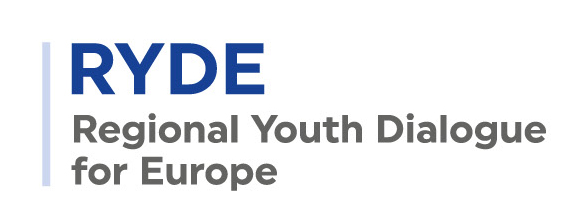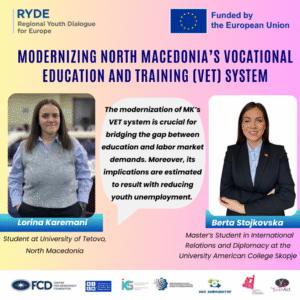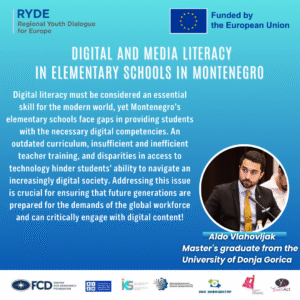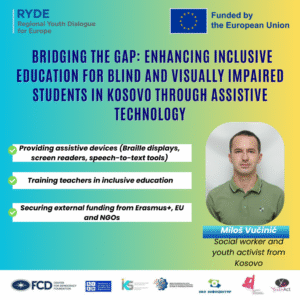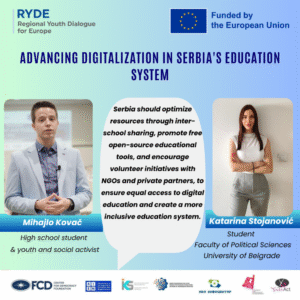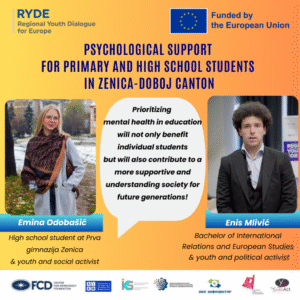Project: Regional Youth Dialogue for Europe (RYDE)
Gender-sensitive language has increasingly become a central issue in contemporary discourse, not just as a matter of inclusivity but also as a reflection of societal norms and values. In the Western Balkans, the need for gender-sensitive language in public spaces is particularly important as the region seeks closer integration with the European Union (EU). The Western Balkans, comprising Albania, Bosnia and Herzegovina, Kosovo, Montenegro, North Macedonia, and Serbia, have made some progress in addressing gender equality, with comprehensive anti-discrimination and violence prevention laws and the adoption of key international standards for the protection of women’s rights. However, language use in public discourse often reflects deep-seated gender biases, which can undermine these efforts. This blog explores the significance of gender-sensitive language in public spaces, reviews the legislative trends across the six Western Balkan countries, and highlights how these nations can align with EU standards on their European integration journey.
Understanding Gender-Sensitive Language
Gender-sensitive language refers to the conscious use of terms that do not discriminate based on gender and that promote equality and inclusivity. It avoids the default use of masculine forms when referring to mixed-gender groups or individuals whose gender is unknown. Instead, it emphasizes the equal visibility of men and women, as well as other gender identities, in both spoken and written communication.
In public spaces, the use of gender-sensitive language is crucial because language shapes perceptions, behaviors, and attitudes. When language consistently reinforces traditional gender roles, it can perpetuate stereotypes and hinder efforts toward achieving gender equality. Conversely, gender-inclusive language promotes equality by recognizing and giving visibility to all gender identities.
Legislative Frameworks in the Western Balkans
Across the Western Balkans, progress toward gender-sensitive language in public discourse has been inconsistent. However, there have been legislative efforts to promote gender equality, including the use of non-discriminatory language. Below is an overview of the current legal landscape across the six countries:
The Albanian constitution guarantees gender equality, and the Law on Gender Equality in Society (2008) seeks to promote equal opportunities for men and women. Although the law does not specifically mandate gender-sensitive language in public administration, recent efforts by the Albanian government have aimed at introducing gender-inclusive terminology in legislation.
The legal basis for the use of gender-sensitive language in Bosnia and Herzegovina can be found in the Gender Equality Law (2010) and the Law on Prohibition of Discrimination (2009). In addition to the legal regulations addressing gender discrimination in language in Bosnia and Herzegovina, there are numerous publications and guides on using gender-sensitive language in both official and unofficial communication, such as The Use of Gender-Sensitive Language in the Parliamentary Assembly of Bosnia and Herzegovina. However, the implementation of the legislation has been uneven across different sectors. While certain institutions, such as the Gender Equality Agency, advocate for the use of inclusive language, public discourse and media representations often lag behind.
Kosovo’s Law on Gender Equality (2015) while comprehensive in addressing gender equality across various sectors, does not explicitly mandate the use of gender-sensitive language in its provisions. As GIZ noted, traditional gender roles and patriarchal language are still common in Kosovo and often go unnoticed, highlighting the need for ongoing awareness efforts.
Gender-sensitive language is said to be both justified and legally grounded in Montenegro’s Constitution, as well as through legislation such as the Gender Equality Law and the Anti-Discrimination Law and there are some measures aimed at promoting non-discriminatory language. For instance, authorities must use gender-sensitive language in job titles, professions, and functions, reflecting the natural gender (male or female) in employment contracts, appointments, academic ranks, and other official documents and records. Still, there is a lack of widespread awareness, and gender-insensitive language continues to be prevalent in public spaces, especially in the media.
Although North Macedonia has made significant strides in promoting gender equality, its legislation, including the Law on Equal Opportunities for Women and Men (2012), does not specifically mandate the use of gender-sensitive language. While the law focuses on ensuring equal opportunities for women and men in public and private sectors, the absence of explicit provisions for gender-sensitive language remains a gap. Recent discussions on gender-sensitive language in Macedonia have highlighted the need to overcome patriarchal norms, but a study of 500 job advertisements shows that most still use the generic masculine form, contributing to women’s invisibility, although there is growing awareness of gender-neutral language in some cases.
Serbia has made substantial progress in adopting gender-sensitive language, particularly in legislative texts and public institutions. The Gender Equality Law (2021) explicitly mandates the use of gender-inclusive language in official documents. Despite this, societal resistance and traditional gender roles continue to influence the broader public discourse. The Serbian Orthodox Church (SPC) organized a conferenceon “Serbian Identity, Serbian Language, and the Gender Equality Law,” where it concluded that gender-sensitive language, based on “gender ideology,” is incompatible with the standard Serbian language and unacceptable to the SPC.
Challenges and Cultural Resistance
Despite legislative frameworks, the broader societal acceptance of gender-sensitive language remains a significant challenge across the Western Balkans. Deeply ingrained cultural norms and traditional gender roles can create resistance to changes in language use. In many cases, gender-sensitive language is viewed as unnecessary or even as an imposition from external forces, including the EU. In rural areas, where patriarchal values are often more pronounced, this resistance can be particularly strong.
The media in the Western Balkans also plays a critical role in shaping public attitudes toward gender-sensitive language. While some outlets have adopted more inclusive practices, many continue to use language that reinforces traditional gender stereotypes. Public figures, especially in politics, often neglect to use gender-sensitive language, setting a poor example for broader society.
Aligning with EU Standards
As the Western Balkans move toward EU membership, alignment with EU norms and practices is essential. The EU promotes gender-sensitive language as a key element in ensuring non-discrimination and inclusivity in public communication. The General Secretariat of the Council of the EU underscores the importance of gender-neutral language, not just for political correctness but also for shaping attitudes and perceptions toward gender equality, with the European Parliament particularly committed to reflecting this in all official communications.
For the Western Balkans, adopting similar policies will be crucial, not only to align with EU standards but also to foster greater societal acceptance of gender equality. As these countries aim for EU membership, the European Commission regularly monitors their progress in gender equality as part of the accession process. The inclusion of gender-sensitive language in public communications is likely to be an area of increasing focus.
What Else Needs to be Done?
To foster greater adoption of gender-sensitive language in the Western Balkans, it is essential to strengthen the enforcement of gender equality laws and introduce clear guidelines for public institutions. Governments should implement strategies similar to those used by the European Parliament, ensuring consistent use of inclusive language. Awareness campaigns and collaboration between civil society and international organizations are also vital in shifting public perceptions and overcoming stereotypes.
Furthermore, integrating gender-sensitive language training in schools, universities, and public institutions will promote long-term behavioral changes. Media outlets should be monitored and encouraged to adopt inclusive language practices, as they play a crucial role in shaping societal norms. These steps are critical not only for aligning with EU standards but also for fostering a more equal and inclusive society.
Author: Samija Kujraković, political activist
* The production of this blog was financed by the European Union. Its content is the sole responsibility of the Network of Progressive Initiative and does not necessarily reflect the views of the European Union.
